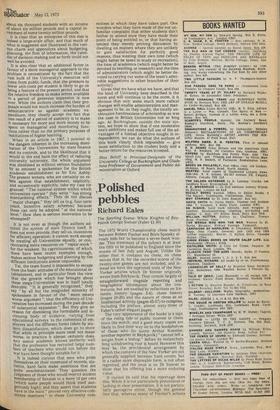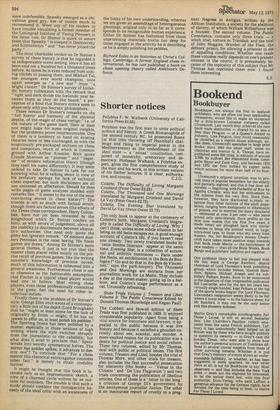P olished pebbles
Richard Eales
The Sporting Scene: White Knights of Reykjavik George Steiner (Faber 0.40) The 1972 World Championship chess match between Robert Fischer and Boris Spassky already bids fair to become a seven-book wonder. This treatment of the subject is at least the fifth to be published in England since the events of last July and August. Unlike the other four it contains no chess; no chess moves that is, for the recorded scores of the twenty-one games are not included, and instead we have the reprinted texts of the New Yorker articles which Dr Steiner originally wrote from Reykjavik. They consist largely of straightforward ringside reporting and biographical information about the contestants, but are swelled by reflections on Icelandic history (pages 5-8), chess history (pages 10-20) and the nature of chess as an intellectual activity (pages 45-57) to comprise, including the preface, almost sixty-three ot Faber's rather elegant pages.
The very appearance of the books is a sign of the rising tide of public interest in chess since the match, and a good many copies are likely to find their way on to the bookshelves of those who (to quote Arthur Koestler, another reporter in Reykjavik) " cannot tell a knight from a bishop," before its melancholy long withdrawing roar is heard. However this may be, the providential arrangement by which the contents of the New Yorher are not generally supplied between hard covers, but in a rather more disposable form, is not often regretted, and the onus is on Dr Steiner to show that his offering has a more enduring value.
It cannot be said that his reportage does this. While it is not particularly pretentious or lacking in clear presentation, it is not particularly perceptive either, though the general line that, whereas many of Fischer's actions were indefensible, Spassky emerged as a chivalrous good guy, has of course much to recommend it. Were any of his readers to have trouble visualising a former member of the Leningrad Institute of Young Pioneers in the latter role, Dr Steiner is quick to assure them that Spassky " is steeped in Dostoievsky and Solzhenitsyn " and " has never joined the party."
The most charitable verdict on Dr Steiner's survey of chess history is that he regarded it as indispensable scene setting, since it has all been said not a hundred but a thousand times before. At times he is even reduced from coining clichés to passing them, and Mikhail Tal,
the youngest ever world champion, once again emerges as " a new star" from "a bright cluster." Dr Steiner's survey of Icelandic history culminates with the remark that " light and dark divide the Icelandic year between them as they do the board," a perception of a kind that literary critics seem to share only with pre-Socratic philosophers. There remain Dr Steiner's remarks on the "full horror and harmony of the abysmal depths, of the magic of chess vertigo," i.e. of the nature of the game itself. Here at least one might hope for some original insights, but the problems prove insurmountable. One of them is a tendency to hand on existing theories more or less unchanged, as with the suspiciously pre-packaged sections on chess and computers, much of which is common ground with Arthur Koestler. Both quote Claude Shannon as " pioneer " and " begetter " of modern information theory (though they spell his name differently). It may seem unkind to take Dr Steiner to task for not knowing what he is talking about in view of his prefatory apology for lack of technical chess expertise, but such disclaimers are all too universal an affectation. Should he then write pages of game analyses studded with remarks like, "It seems to me one of the most convincing , moves in chess history"? The trouble is not so much with factual errors, though there are factual errors (the efforts of the Times chess correspondent, Harry Golombek, have not yet been rewarded by the knighthood which Dr Steiner confers on him), as with errors of judgement, above all the inability to discriminate between alternative authorities. One need only quote the pithy but ignorant remark: "Of eminent masters Petrosian is the most boring. His finest games are draws." Among Dr Steiner's more general themes, it just is not true that the master chess player relies mostly on the precise recall of previous games; like the writing novelist's knowledge of previous novels, much of this information is subsumed into a general awareness. Furthermore chess is not so obsessive as the fashionable assumption that Fischer is a typical chess player would lead one to believe. Most strong chess players, even those professionally committed to the game, feel the need for other intellectual outlets.
Finally there is the problem of Dr Steiner's style. George Eliot once wrote of a contemporary a little out of his depth (Lord Brougham) that he " might at least atone for the lack of originality by finish — might, if he has no jewels to offer us, at least polish his pebbles." The Sporting Scene has been polished by a master, especially in those sections of high writing where the style switches abruptly from the journalistic to• the cabalistic, but what does it avail to proclaim that," Space breaks into weirdly symmetrical halves. The mirror has sudden spikes, it advances to destroy one"? To conclude that "For a chess master this rhetorical extravagance connotes sober fact" is merely to strain credulity further.
It might be thought that this book is intended only as an impressionistic sketch, a view of a charmed circle written by an outsider for outsiders. The trouble is that such a study should combine the introspective honesty of the ideal critic with an awareness of the limits of his own understanding, whereas we are given an assemblage of heterogeneous gleanings, original only in so far as it corresponds to no recognisable human experience. Either Dr Steiner has fashoined from these unpromising materials truths too deep for those engaged in the activity he is describing or he is simply polishing his pebbles.
Richard Eales is an historian at Christ's College, Cambridge. A former England chess international, he has just published a book on chess opening theory called Alekhine's Defence.



































 Previous page
Previous page